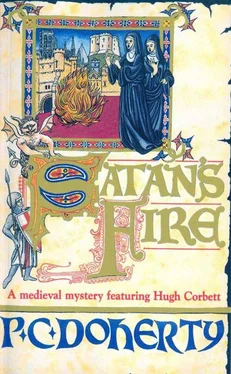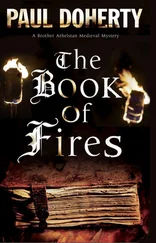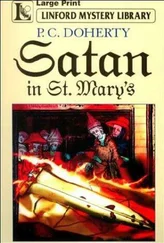Paul Doherty - Satan's Fire
Здесь есть возможность читать онлайн «Paul Doherty - Satan's Fire» весь текст электронной книги совершенно бесплатно (целиком полную версию без сокращений). В некоторых случаях можно слушать аудио, скачать через торрент в формате fb2 и присутствует краткое содержание. Год выпуска: 2012, ISBN: 2012, Издательство: Headline, Жанр: Исторический детектив, на английском языке. Описание произведения, (предисловие) а так же отзывы посетителей доступны на портале библиотеки ЛибКат.
- Название:Satan's Fire
- Автор:
- Издательство:Headline
- Жанр:
- Год:2012
- ISBN:9780755350360
- Рейтинг книги:3 / 5. Голосов: 1
-
Избранное:Добавить в избранное
- Отзывы:
-
Ваша оценка:
- 60
- 1
- 2
- 3
- 4
- 5
Satan's Fire: краткое содержание, описание и аннотация
Предлагаем к чтению аннотацию, описание, краткое содержание или предисловие (зависит от того, что написал сам автор книги «Satan's Fire»). Если вы не нашли необходимую информацию о книге — напишите в комментариях, мы постараемся отыскать её.
Satan's Fire — читать онлайн бесплатно полную книгу (весь текст) целиком
Ниже представлен текст книги, разбитый по страницам. Система сохранения места последней прочитанной страницы, позволяет с удобством читать онлайн бесплатно книгу «Satan's Fire», без необходимости каждый раз заново искать на чём Вы остановились. Поставьте закладку, и сможете в любой момент перейти на страницу, на которой закончили чтение.
Интервал:
Закладка:
Corbett put his pen down and went out to stand by the window. Daylight was fading: already lamps and torches had been lit, and even Ranulf was muttering that the light was too poor to read by. Corbett tried to marshal his thoughts. He wished to return to Maeve but there was a deep feeling of unease, a sense of growing menace: the warnings against the king in London, the daggers left pinned in the doors of St Paul’s; that strange, macabre murder on the road outside York. Who had been that unfortunate rider? Who had cut his body in two then mysteriously burnt the top half? Why was Jacques de Molay in England? And what did the Templars have to hide? Outside in the priory grounds, an owl hooted, proclaiming its coming hunt through the night. Corbett recalled an old soldier he had known in his fighting days along the Welsh march.
‘When the owl hoots before dusk,’ the man had warned, ‘the devil is about to walk!’
Chapter 2
At the manor of Framlingham, Guido Reverchien, Keeper of the Templar Estates in Yorkshire, was making his daily, lonely pilgrimage along the pebbledashed path of the great maze. Guido made this pilgrimage, as usual, on his hands and knees, chanting the Divine Office of the Church in atonement for his sins. Guido, now in his sixtieth year, his hair and beard white, his skin almost burnt black by the sun, still believed he carried a great burden of sin. He had been a Templar knight, a warrior of Christ: one of those who had defended the walls of Acre in 1291 until the Mameluke hordes had swept across its walls and turned that Templar city into a sea of blood. Guido had escaped: shoulder to shoulder with his comrades, he had fought his way down from the quayside to one of the few remaining boats waiting to take him and other refugees out to the Christian fleet. Oh, Guido had fought! At times the narrow, dusty streets of Acre became ankle-deep in blood: yet, still, the city had fallen and he, Guido Reverchien, had been saved. Ever since that terrible night, Guido had suffered nightmares. Every minute of his sleep seemed to be trapped in the destruction of Acre.
As the years passed, Guido had reached the conclusion that he should have died in Acre. He should have fought on until the enemies of Christ had killed him and so given others the opportunity to escape.
‘Instead,’ Guido had whispered to his father-confessor, ‘I came back to England. I was given a comfortable benefice supervising the granaries, granges, fields and meadows of the Templar Order. Father, I am a traitor to Christ, I failed God. I must go back and be saved.’ Time and again his father-confessor had advised him that this was out of the question.
‘You are needed in England,’ he whispered back from behind the lattice screen. ‘You have your duties here.’
But Guide would not be comforted until his father-confessor had mentioned the maze. This lay to the side of the Templar manor: a great sea of high, cruel, privet hedge with narrow paths leading to its centre, where a huge wooden cross stood bearing the image of the crucified Christ.
‘You cannot go to Jerusalem,’ Father-confessor had confided. ‘But, Sir Guido, if you must atone for your sin; if you seek to do reparation; every day, just before dawn, go on your knees through the maze chanting the psalms.’
Now Guido did that. The pebbles dug deep into his knees but Guido saw this as his path to heaven as he shuffled along, the battered, wooden rosary beads slipping through his gnarled fingers. He knew the maze like the back of his hand. Every secret corner, each blind path. Sometimes Guido would deliberately take the wrong turnings intensifying his pain, feeling a release from his self-inflicted tortures. At last he reached the centre. His knees were now bloodied, the pain in his shoulders and arms intense. The sweat ran like water down his face.
‘I am in Jerusalem,’ he whispered, staring up at the cross. ‘I have kept faith!’ He crawled on his hands and knees to the stone base of the crucifix and looked up at the stricken face of his Saviour. ‘Domine,’ he murmured, striking his breast. ‘I have sinned before heaven and before Thee!’
Guido took a tinder from his pouch and lit the three squat yellow candles which stood in their iron spigots on the steps before the cross. He moved his knees away from the pools which had formed amongst the pebbles and watched the flames of the candle flicker in the dawn breeze. He stared up at the crucifix.
‘Just like Acre,’ he whispered. ‘A grey dawn, flames flickering.’
Guido narrowed his eyes; even the smell of that damned burning city seemed to haunt him. The candle flame grew stronger, suddenly there was fire all around him. Guido opened his mouth to scream just as a sheet of flame engulfed his body.
Edward of England was entering York with banners and pennants flying. Heralds walked in front of the long procession which wound its way under Micklegate Bar. Behind the king trundled a long train of carts and pack animals, lines of pike men and archers marching on either side. The city had been busy as an upturned beehive, because only at the last minute had the royal heralds proclaimed through which gate the king would come. Now all of York had turned out to greet him: the burgesses in their fur robes and ermine-lined cowls; their wives and daughters, clothed in the most costly sarcanet and samite dresses, their brows plucked, their lustrous hair covered by the most ornate head-dresses and veils. Parish priests in colourful chasubles had brought their parishioners as well as stoups of holy water and asperges rods to bless the king as he passed. The city council had done its best. The streets and sewers had been cleaned, the sore-ridden beggars driven away, the stocks emptied and the gibbets and their iron cages taken down. The Guilds of Corpus Christi and Trinity were well represented under their great many-coloured banners.
The mayor and his aldermen had met the king outside Micklegate Bar and handed him the keys of the city on a purple cushion. They’d widened the king’s smile even more with purses full of gold and silver coins. Edward had expressed his thanks, accepting their protestations of loyalty and thrust the purses into de Warrenne’s hand.
‘Keep your eye on them,’ he whispered. ‘I don’t want a penny to go amiss.’
Just within Micklegate Bar, they stopped and listened as a choir of boys in white surplices sung a three-voiced hymn welcoming the king, praising his rule and extolling his victories. Then the royal progress had continued into the city itself, along the narrow streets, past the great houses with their beams painted a polished black, the plaster between gleaming a brilliant white in the morning sun. Despite the city ordinances, all the colourful underworld of York was also present. The whores and prostitutes in their low-cut gowns and orange and red wigs eyed the soldiers and tried to catch the eye of the mounted knights and sergeants-at-arms. The masterless and penniless alley folk were also there, sheltering in the shadows away from the sunlight, ready to flee at the approach of any city bailiff. The cripples, the song-chanters, the cut-throats, the foists and pickpockets had gathered around looking for easy prey. The stalls had been put away and the merchants and their apprentices, each in the colour of their guild, stood gawping, eager to catch a glimpse of their great king.
Edward did look the image of the Conquering Prince: a gold circlet round his iron-grey hair, his coat of chainmail, which Corbett had insisted he wear, covered by a golden samite surcoat. Edward rode his great destrier, Black Bayard, and its saddle and harness were of dark purple leather edged with silver. The king rode easily, one hand holding the reins, the other bearing a magnificent snowy-white hawk from Paris. Beside him, John de Warrenne, Earl of Surrey, dressed in half armour, carried the king’s personal banner, a golden lion rampant on a field of blood. Corbett rode just behind the king, restless and worried: his eyes constantly surveyed the crowds and the open windows on either side of the procession. Now and again he would feel the hilt of his dagger and glance anxiously sideways at Ranulf. His manservant, however, was more interested in smiling and blowing kisses at the wives and daughters of the burgesses. Every so often the procession would pause and the gloriously garbed heralds blew a silver fanfare before advancing further into the city, behind the fluttering banners bearing the arms of England, Scotland, Wales, France and Castille.
Читать дальшеИнтервал:
Закладка:
Похожие книги на «Satan's Fire»
Представляем Вашему вниманию похожие книги на «Satan's Fire» списком для выбора. Мы отобрали схожую по названию и смыслу литературу в надежде предоставить читателям больше вариантов отыскать новые, интересные, ещё непрочитанные произведения.
Обсуждение, отзывы о книге «Satan's Fire» и просто собственные мнения читателей. Оставьте ваши комментарии, напишите, что Вы думаете о произведении, его смысле или главных героях. Укажите что конкретно понравилось, а что нет, и почему Вы так считаете.












